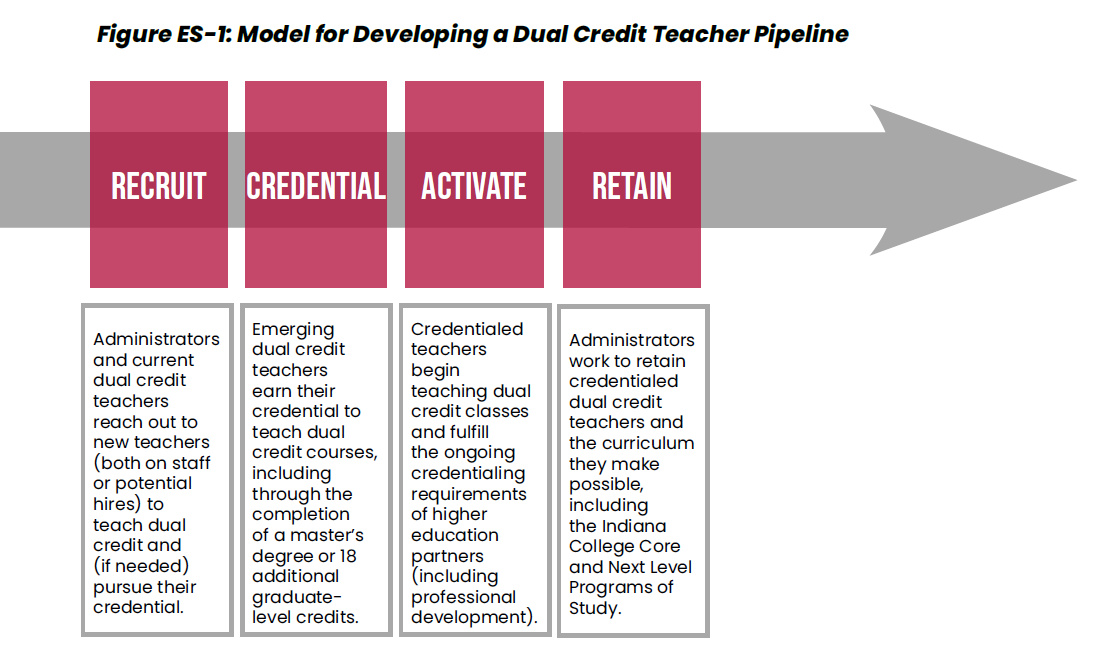Growing the rural teacher pathway and ensuring that rural students graduate high school ready for their next steps in life are both fundamental to Rural Schools Collaborative's mission to support community development centered around our public school systems. Not only do we endorse a growing community of good work and learning spearheading rural teacher preparation, but our collaboration with the GRAD Partnership Program ensures we are working for student success as well. The Center for Excellence in Leadership of Learning at the University of Indianapolis (CELL), our Indiana & Great Lakes Hub partners, recently issued a white paper summarizing interview, working group, and survey data highlighting the intersection of teacher and student preparation in dual-credit courses. The CELL team underscores the imperative to expand the pool of dual-credit educators so that students are best ready for college and career after graduation. The publication was announced in this press release, and we highly encourage you to read the full report here and to reach out to CELL with any questions you may have regarding this work. Thank you to CELL for their continued hard work to serve rural schools and students and for sharing this research with us.
Indianapolis, IN - March 3rd, 2022
The Center of Excellence in Leadership of Learning (CELL) at the University of Indianapolis, in partnership with Education Northwest, recently released a report addressing the projected shortage of dual credit teachers in Indiana - Expanding Early Access to College And Careers: Recommendations for Prioritizing and Growing Indiana’s Pipeline of Dual Credit Teachers through Incentives and Supports. Written for an audience of K12 educators, this report offers new research and recommendations aimed at helping schools preserve and grow their dual credit opportunities by building a more robust and diverse supply of teachers credentialed to teach these important courses.
Dual credit courses are a proven model for helping more Indiana students graduate from high school prepared to succeed in college and the workforce (Indiana Commission for Higher Education [ICHE], 2021; U.S. Department of Education, 2019). However, these vital opportunities are at risk due to a statewide shortage of teachers who are credentialed to deliver dual credit courses. Further, the already limited supply of teachers is projected to significantly decrease by September 2023, when new dual credit teacher credentialing guidelines from the Higher Learning Commission take effect. Building a sustainable pipeline of dual credit teachers is imperative if Indiana hopes to grow, or even sustain, the positive outcomes these courses provide for Hoosier students, including increased rates of high school graduation and postsecondary enrollment, persistence, and completion (ICHE, 2021).

The goal of the Expanding Early Access to College and Careers report
is to help Indiana’s K-12 schools preserve and grow dual credit
opportunities for students by building a more robust and diverse supply
of teachers credentialed to teach these important courses. Written for
an audience of K-12 administrators, teachers, and school board members,
this report provides:
- New findings related to Indiana schools’ current practices to engage dual credit teachers.
- A framework of recommendations for growing a school’s pipeline and supply of dual credit teachers.
- Considerations for future local- and state-level strategies to build a larger and more diverse supply of dual credit teachers in Indiana.
The research for this report occurred over nine months and involved more than 130 Indiana educators. Takeaways include:
- Indiana educators face five barriers to engaging more teachers in dual credit: time, cost, navigating the process, feelings of isolation, and limited awareness of the impact of dual credit on students.
- Some Indiana schools are addressing these barriers through innovative practices that provide either a) financial incentives for teachers to engage with dual credit (70 percent of schools) and/or b) non-financial support such as mentoring and additional time in the school day to complete dual credit course requirements.
- Schools can build their pipeline of dual credit teachers by implementing a framework of 11 recommended strategies related to prioritizing dual credit, providing financial and non-financial incentives and support to teachers, and partnering closely with the school’s higher education dual credit partners.
- Dual credit exists within a broader context of educational priorities in Indiana that are not separate from, but vital to, the state’s ability to leverage dual credit as an opportunity for both students and teachers.
To read more, download the PDF at https://bit.ly/CELLresearch2022
In Case You Missed It!
The CELL Team, headed up by Director of Operations Kyleigh Gerlach and Executive Director Carey Dahncke, hosted a virtual webinar discussing the overview and applications of the white paper. Over 80 teachers, district leaders, and local partners from around Indiana joined the session to hear more about the findings of the report. The webinar featured a panel discussion from LaKisha Hillard, the Director of K-14
Initiatives at Ivy Tech Community College, and Josh Blossom, principal of the rural-located Wabash High School. LaKisha and Josh explained the practical impacts of the white paper and fielded questions from the audience. You can watch the whole webinar on CELL's Youtube Channel.
CELL is a leading convener, catalyst and collaborator for dynamic, innovative education change in Indiana. CELL is committed to all Indiana students, regardless of background, graduating from high school equipped with the skills and knowledge necessary for success in postsecondary education, training and the 21st -century global economy. To realize that vision, CELL has worked extensively to establish early college readiness programs in rural high schools across Indiana with their Rural Early College Network. This white paper is yet another progressive step forward in the CELL's work for student achievement.

